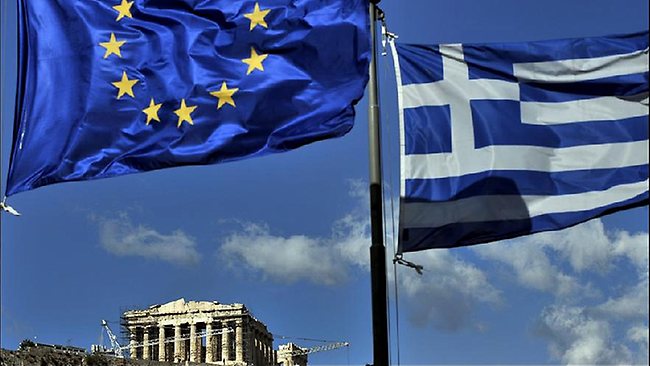A stand-off is taking place between the Greek government and the country’s creditors that could end up with Greece defaulting on its debt, leaving the euro and even the EU itself. This would have very serious consequences both for the Greek people and the European and world economy. What is this leading to?
The country has debts of around €315 billion, the equivalent of 175% of GDP. In early May it has to make payments of €1 billion to the IMF. By the end of June it must make payments of €2.5billion and in July and August €6.7 billion of bonds held by the ECB mature. On top of this it needs to pay €1.7bn in wages and pensions before the end of April. Time is running out!
Under the second rescue package Greece was expecting to receive a final tranche of €7.2 billion, but this money has been held back as a way of blackmailing the Syriza government into buckling under and giving up on its promises of alleviating austerity for the Greek working people. The money will only be released if Syriza comes up with a package of further cuts, i.e. if it agrees to continue with the austerity measures put in place by the previous government.
The irony of the situation is that even if the government were to successfully get its creditors to release the €7.2 billion euros, this would only buy them time until after the summer. Then the whole drama would open up again, as more payments would become due and more demands would be placed on the government to cut spending and increase revenues.
Unpayable debt
Between 2010 and 2014 Greece received a total of €254.4 billion euros in the bailout packages. But €40.6 billion of this went on paying interest on the accumulated debt alone. A further €48.2 billion went to the banks on recapitalisation. In fact, only 5% of the total amount went into government cash needs. This debt has clearly become unpayable and all serious bourgeois analysts can see that. It is not a question of “if” but “when” Greece will eventually default.
So far the Syriza leaders have consoled themselves with the idea that “Europe” would never allow such an eventuality to become reality. Earlier this month Tsipras declared the following: “I am convinced that Europe of democratic traditions and the Enlightenment will not give in to the extreme voices of some, will not choose the path of an unethical and brutal financial blackmail but the path of bridging differences, the path of stability and mutual respect, and above all, the path to democracy, for the benefit of our common European future.”
 Yanis VaroufakisThis is in line with the illusions of Tsipras’s finance minister, Varoufakis, that it is possible to appeal to the rationality of at least a section of the bourgeoisie. This ignores completely what drives the capitalists, the quest for profit. European finance capital has put a lot of money into Greece and it wants to see a return on its investment. If it becomes abundantly clear that their money is lost and cannot be recovered, then at some point they will decide to cut their losses and run.
Yanis VaroufakisThis is in line with the illusions of Tsipras’s finance minister, Varoufakis, that it is possible to appeal to the rationality of at least a section of the bourgeoisie. This ignores completely what drives the capitalists, the quest for profit. European finance capital has put a lot of money into Greece and it wants to see a return on its investment. If it becomes abundantly clear that their money is lost and cannot be recovered, then at some point they will decide to cut their losses and run.
What has held them back from doing this so far has been the fear of contagion and the potential for a Greek default to become a European-wide crisis, both economically and politically. But that section of the capitalist class, especially in Germany, that is convinced of the need to let Greece sink is growing.
"Everything must be done to prevent" Greece from running out of money, Angel Merkel, the German Chancellor, said last week. "On the German side, we are prepared to provide all the support that is asked of us. But of course reforms must be done," she added. [Our emphasis] The German government is standing firm in its insistence that the Syriza government must abandon all promises of ending austerity. In particular they are insisting on further deregulation of the labour market and more cuts in pensions.
Tsipras is desperately hoping for some kind of compromise, and in one of his latest TV interviews he has stated that he believes an interim deal will be in place by 9 May. "I believe we are close. I believe that if no-one wants to undermine or torpedo [the talks] we are close to an accepted package," and added that there would be concessions on the part of the Greek government, such as the partial privatisation of the port of Piraeus and the leasing of 14 regional airports.
The recent reshuffle in the Greek negotiating team with the replacement of Varoufakis for Tsakalotos should be seen in this light. Tsakalotos is not only a man the capitalists describe as “soft-spoken” (meaning “amenable to compromise”) but also comes from the inner core of Syriza itself (as opposed to Varoufakis who is not a party member) and he would be better positioned to attempt to convince the party ranks of any compromise.
Which way for Syriza?
The point is that any concessions made now will only serve to prepare further concessions in the future when more loans will have to be negotiated, until Syriza is forced to give up completely on the programme it was elected on. In the end the government has only two options, either to surrender completely and renege on the mandate it was elected on or default on the debt.
The problem with the first option is that it would widen further the internal contradictions inside Syriza, where the Left is strong. It would prepare the ground even for a possible split of Syriza with the openly pro-capitalist right wing breaking with the Left and it would mean the end of the Syriza government. It would lead to disillusionment among the many who voted for the party, with a significant section being radicalised to the left and others looking to other parties, including on the right.
 The second option would lead directly to a default, which would mean Greece being pushed out of the euro and even the EU itself, with the country having to return to the drachma. On a capitalist basis this would involve a huge collapse in the economy and continued suffering for the Greek masses, which would also rip Syriza apart in the process.
The second option would lead directly to a default, which would mean Greece being pushed out of the euro and even the EU itself, with the country having to return to the drachma. On a capitalist basis this would involve a huge collapse in the economy and continued suffering for the Greek masses, which would also rip Syriza apart in the process.
Consequences of exiting the euro
Bourgeois commentators have been looking at the consequences of such a scenario. The Independent posed the question in an article, Grexit: How likely is a Greek exit from the Euro and what would happen to the economy? Its answer? “An immediate financial crisis and a new, deep, recession. Without external financial support the country would have to default on its debts and, probably, start printing its own currency again in order to pay civil servants. Its banks would also lose access to funding from the European Central Bank.”
“To prevent these institutions collapsing Athens would have impose controls on the movement of money out of the country. The international value of the new Greek currency would inevitably be much lower than the euro. That would mean an instant drop in living standards for Greeks as import prices spike. And if Greeks have foreign debts which they have to pay back in euros they will also be instantly worse off. There could be a cascade of defaults.”
The article goes on to look at the possibility that a weaker currency could make Greek exports cheaper and eventually lead to a recovery, but concludes that “this is highly uncertain.”
The reason for this is clear. It is not only Greece that is in crisis, but the whole of the European economy is stagnating and worldwide the economy is slowing down. In a contracting market the most productive and competitive survive, while the others go to the wall. Furthermore, if a Greek default leads to exit from the EU, Greece would also have less access to the wider European market. And having defaulted, it would have no access to credit.
An article that appeared in Forbes, Why Greek Exit From The Euro Would Be A Very Bad Idea, depicts the following nightmare scenario:
“The real risk is that a Greek sovereign default would render Greek banks’ collateral worthless, making it impossible for them to obtain even emergency funding. This would technically bankrupt the Greek central bank and trigger disorderly collapse of the Greek banking system. (…)
“The majority of Greek sovereign debt is held not by banks – even Greek ones – but by a range of EU institutions including the ECB, the EFSF and Eurozone governments through bilateral lending. And by the IMF. All of these institutions would lose substantial amounts of money if Greece defaulted on its debt. This would be the case whether or not Greek default was accompanied by exit from the Euro. (…)
“When a sovereign defaults, the systemic shock transmits itself to others through the balance of payments channel as trade is abruptly truncated and capital flees. (…)It is particularly disastrous for those countries with the strongest trade links to the defaulter. In the case of Greece, that would be Eurozone countries, Russia and Middle Eastern oil and gas exporters.”
The writer then adds an interesting conclusion, “The Eurozone would also therefore suffer a sharp recession, as would its trade partners. Periphery countries such as Spain would find their green shoots of recovery squashed, their fiscal deficits rising again and their debt/gdp soaring. Further austerity to bring these down would no doubt be imposed, increasing public unrest and improving the electoral prospects of populist parties such as Podemos.”
Contagion – economic and political
As we said, the risk of contagion of the Greek crisis is not only economic, as we see from the above Forbes article, but also political. The behaviour of German and European finance capital cannot be explained solely by looking at the Greek economy. After all, Greek GDP represents no more than 2% of overall Eurozone GDP. They could quite easily afford to make more concessions to Greece. The problem is that any concession made to Greece would lead to countries like Ireland, Portugal, Spain and Italy demanding similar concessions and the latter two are much bigger economies, Italy being the third largest in the Eurozone, with a debt that makes Greece’s problems look like peanuts.
The rise of Podemos in Spain, which the Forbes analyst touches on, is of concern to the serious strategists of capital. If Syriza is seen to be winning important concessions from the EU that would lead to an alleviation of austerity, this would enormously strengthen Podemos in Spain, which is seen as playing a similar role to Syriza. In turn, this could encourage the development of similar phenomena across Europe, and then the European capitalists would be facing a Europe-wide revolt against austerity and find themselves in an extremely unstable political situation.
The bourgeois require stable governments of either a conservative or “social-democratic” character. When the conservatives lose support after carrying out austerity they call in the B-team of social democracy to take their place and continue with the same austerity policies. But this system is breaking down. The social democracy has been involved in carrying out severe austerity measures and has begun to pay a heavy price for this. The collapse of the PASOK in Greece is the clearest example of this. But we also have the decline of the French Socialist Party, the Spanish PSOE, the complete collapse of the old Communist Party in Italy, and in Britain we see a Labour Party that is struggling to win enough support to defeat the Tories in the forthcoming elections.
The bourgeois are seeing a fragmentation of their political system. Where there were two major parties we are now beginning see several parties emerging, rendering the task of governing society, which means imposing austerity while at the same time avoiding a revolt of the masses, ever more difficult.
European workers seeking way out
The masses of Europe are looking for a way of ending austerity and are prepared to vote for any credible political force that they perceive as being able or willing to do this. What it means is that the masses are seeking a way out of capitalism. They may not be fully conscious of this, but their opposition to the policies imposed by the capitalists puts them on a collision course with the system as a whole. In the long run it leads to the inevitable conclusion that what is required is a revolution to radically transform society.
The crisis in Greece shows precisely this. The masses want Syriza to carry out its programme and they hope that this can be achieved by negotiating firmly with the EU, the ECB and the IMF, opposing their draconian austerity measures, and getting the relief they yearn for. But they are in the process of learning that on the basis of capitalism there is no end to this austerity.
That is where the weakness of the Syriza leadership lies. They do not believe that the masses are capable of drawing revolutionary conclusions, and that is why they seek half-way measures and compromises. But there is no room for such compromises. The serious bourgeois believe that at most within one or two years Greece will be out of the euro anyway.
Once that happens Syriza must be capable of adopting the necessary measures, which will involve nationalising the whole of the Greek banking system, expropriating the oligarchs and using the wealth they presently hold in order to begin reconstructing the economy along socialist lines.
Staying within the EU and the euro on a capitalist basis means endless austerity and suffering for the Greek masses. Exiting the euro and the EU on a capitalist basis also opens up the road to economic collapse and a huge decline in living standards. The only real way out is to explain all this openly and honestly to the Greek masses and prepare the ground for a revolutionary movement towards a socialist transformation of society.

